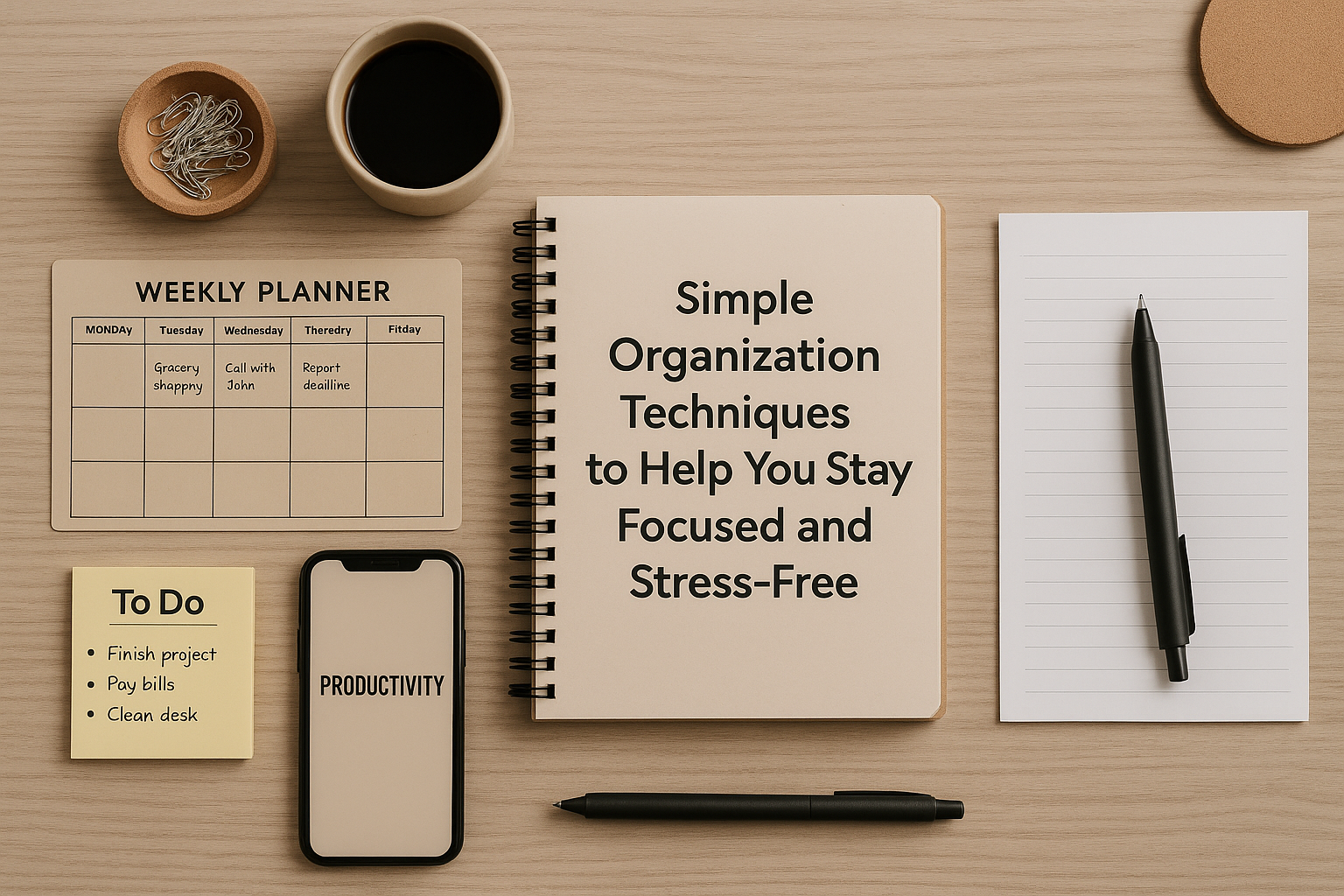In a world filled with distractions, staying organized isn’t just about keeping things tidy — it’s about creating space in your mind, managing your energy, and setting yourself up for consistent success. Whether you’re managing work, home, studies, or personal goals, the right organization techniques can make a world of difference.
Let’s explore simple yet powerful strategies that will help you stay focused, productive, and stress-free.
The Link Between Organization and Mental Clarity
Disorganization is more than just physical clutter — it creates mental clutter too. When your environment is chaotic, your brain has to work harder to filter distractions, remember where things are, and make decisions. This leads to fatigue, procrastination, and burnout.
Benefits of being organized:
- Greater focus and concentration
- Reduced stress and anxiety
- Increased productivity
- Better decision-making
- Improved time management
1. Use the “One-Touch” Rule
A simple yet life-changing principle: handle each item or task only once. Whether it’s an email, a document, or a pair of shoes, deal with it immediately instead of letting it pile up.
Example: When you open an email, respond or archive it right away — don’t leave it “for later.”
2. Create a Home for Everything
Everything you own or use frequently should have a specific place. This helps you avoid wasting time searching for things and makes tidying up almost automatic.
Try this:
- Use labeled containers or boxes for small items
- Keep like items together (all office supplies in one drawer, for example)
- Store items near where you use them
3. Practice the “2-Minute Rule”
If something takes less than two minutes to complete, do it immediately. This technique, made popular by productivity expert David Allen, prevents small tasks from snowballing into overwhelming to-do lists.
Examples:
- Replying to a quick message
- Putting your shoes away
- Washing a single dish
4. Start with a Daily Reset
Take five to ten minutes at the start (or end) of your day to reset your space and mind. Clear your desk, close tabs, review your calendar, and plan your top priorities.
Morning reset: Set your top 3 goals and organize your workspace.
Evening reset: Tidy up, log completed tasks, prepare for tomorrow.
5. Use a Simple Task Management System
You don’t need a complicated app to stay on top of your to-dos. Choose a system that works for you and stick with it.
Options:
- Digital: Todoist, Notion, Trello, Google Tasks
- Paper-based: Bullet journal, weekly planner, sticky notes
Pro tip: Break tasks into actionable steps and group them by context (e.g., errands, phone calls, deep work).
6. Apply the “One In, One Out” Rule
To avoid clutter, adopt a minimalist mindset: for every new item you bring into your space, remove one. This keeps your possessions purposeful and your environment clean.
Try it with:
- Clothes
- Apps on your phone
- Office supplies
7. Schedule Everything (Even Breaks)
Highly organized people plan not just meetings and deadlines, but also focus blocks, meals, and downtime. A well-structured day gives you more freedom, not less.
Use time blocks:
- 9–11 AM: Deep work
- 11–12 PM: Meetings
- 1–1:30 PM: Lunch
- 3–3:15 PM: Break/walk
8. Declutter Digitally
Your phone and computer can be just as messy as your home. Digital clutter slows you down and adds stress.
Declutter weekly:
- Unsubscribe from emails
- Organize files into folders
- Delete unused apps
- Clear desktop icons
9. Batch Similar Tasks Together
Switching between tasks drains mental energy. Instead, batch similar tasks and do them in one go.
Examples:
- Answer emails in one time slot
- Run errands all in one trip
- Schedule all your calls back-to-back
10. Keep a “Maybe Later” List
Some ideas and tasks are worth noting but not acting on immediately. Instead of letting them distract you, write them down in a separate list for review later.
Benefits:
- Keeps your main task list focused
- Reduces decision fatigue
- Captures inspiration without cluttering your mind
Organization is a Habit, Not a One-Time Fix
The secret to staying organized is consistency. It’s better to do a little every day than to wait for a major clean-up. With small, intentional habits, you can transform your space, clear your mind, and boost your productivity.
Start with one or two techniques from this list, and build up slowly. Over time, being organized will become part of your identity — and staying focused and stress-free will feel natural.
